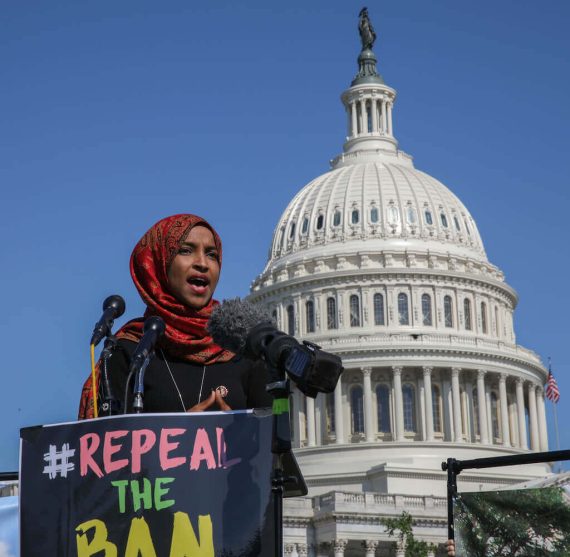Last month, Congresswoman Ilhan Omar (D-MN) was referred to as a terrorist and “suicide bomber” by Rep. Lauren Boebert, who has made several Islamophobic remarks towards Omar, and other members including Rep. Rashida Tlaib. Yet again, these remarks went unchecked, leading Muslim staff within Congress to send an open letter to House leadership. Signed by a total of 440 House and Senate staffers, 62 being Muslim, the letter urged leaders to act in the face of heightened Islamophobia, especially within the building, by rejecting and condemning anti-Muslim bigotry.
“Witnessing unchecked harassment of one of only three Muslim members of Congress – and the only visibly Muslim member – we feel that our workplace is neither safe nor welcome,” the letter to House Leadership read.
In the last two decades, mainstream U.S. political discourse has dehumanized Muslims and served as a justification for their persecution domestically and abroad.
From the post-9/11 surveillance apparatus structured by the Patriot Act to the gruesome wars in Afghanistan and Iraq that took the lives of millions, the common denominator was the use of Muslims as political collateral. Islamophobia is the manifestation of the dehumanization of Muslims, which was institutionalized through these kinds of policies.
Many Muslims have joined the political sphere to lobby for their full rights and protections under the U.S. constitution.
Muslims in America have mobilized and organized against racist domestic and foreign policy across this time by creating advocacy organizations, mutual aid groups, and community centers. They have worked to counter the discrimination faced by Muslims in America at a grassroots level. Many Muslims have even joined the political sphere to lobby for their full rights and protections under the U.S. constitution.
The number of Muslims running for office and participating in political decision-making has risen worldwide. With the emergence of Muslims being elected into spaces such as Congress, Parliamentaries, and state legislatures, unhinged right-wing attacks on Muslim candidates and elected officials have been on the rise, too.
As they gain political momentum, the implicit and explicit appearances of institutionalized Islamophobia appear in outbursts, racialized commentary from colleagues, and even legislation. In recent years, anti-Muslim rhetoric and attacks in political discourse have carried a common pattern in targeting Muslim women. Noticeable by their headscarf, name, or background, Muslim women, including Rashida Tlaib and Ilhan Omar, have been of the most targeted Congress members by right-wing media and politicians in the last few years.
Data conducted by the Institute for Social Policy and Understanding has consistently found that American Muslims are the faith group most likely to recount experiencing religious discrimination, at about 60% between 2016 and 2020. This is reflected in modern political discourse, where Islamophobic violence, or threats of violence, and overall dehumanization of Muslim individuals have been fueled by political parties and have commonly gone unchecked and uncondemned by prominent political leaders.
Following the anti-Muslim slander, Reps Omar and Schakowsky’s introduced the Combating International Islamophobia Act, which was passed in the House Foreign Affairs committee last Friday. This bill would drive the State Department to generate a more comprehensive approach to fighting the international increase of Islamophobia, expanding its capacity to monitor and confront state and non-state actors worldwide and providing a safer environment for American Muslims.
Given the rise of anti-Muslim rhetoric, bigotry, and violence fueled by political parties, transnational white supremacists, and Islamophobic hate group networks, this bill seems like an obvious step towards humanizing and protecting Muslims in the U.S. and across the world.
But even with the disturbing statistics portraying the need to work against anti-Muslim bigotry and rhetoric, republicans spent their time mocking the Islamophobia bill during the hearing, further demonstrating the dehumanization of Muslims.
The bigotry displayed by politicians such as Boebert’s factors into an extensive history of Islamophobia, and Xenophobia in general, being weaponized against ethnic and religious minorities within positions of power, mainly to provoke fear and cause division. It is also a product of the threat felt when an individual such as Ilhan Omar, a Black Muslim woman who’s also an immigrant, brings a new political perspective that represents more than just White Americans in discourse and policy.
Recommended
The U.S. is in the midst of confronting the skeletons in its closet. One of the most common and consistent forms of Islamophobia within the U.S. has been structural. It has reflected itself within the historical roots of our political dynamics via common attempts of anti-Muslim legislation and perpetuated by deeply politicized dialectic Islamophobia through different modes.
These methods consist of consistent misrepresentations of Muslims within media, policing and surveillance, and unequal treatment within the legal system. The cherry on top has been the repetitive use of anti-Muslim rhetoric and statements made by political candidates and government officials heightened through social media.
Silence is not an option. To deinstitutionalize Islamophobia within our political systems, it must start with Congress taking a firm stance against the rising dehumanization of Muslims and open anti-Muslim bigotry. This is not an issue that is limited to political figures such as Congresswoman Omar- it is directly affecting hundreds of Congressional staffers and millions of U.S. Americans.
Furthermore, our duty as Americans is to ensure all are treated equally within our political and legal system. As Muslims continue the fight against institutionalized Islamophobia through grassroots advocacy efforts, we must continue to vocalize our demands for justice and equality with our elected officials and the American public.

VIDEO: Why the Far-Right Is Rising Globally – Emergence





